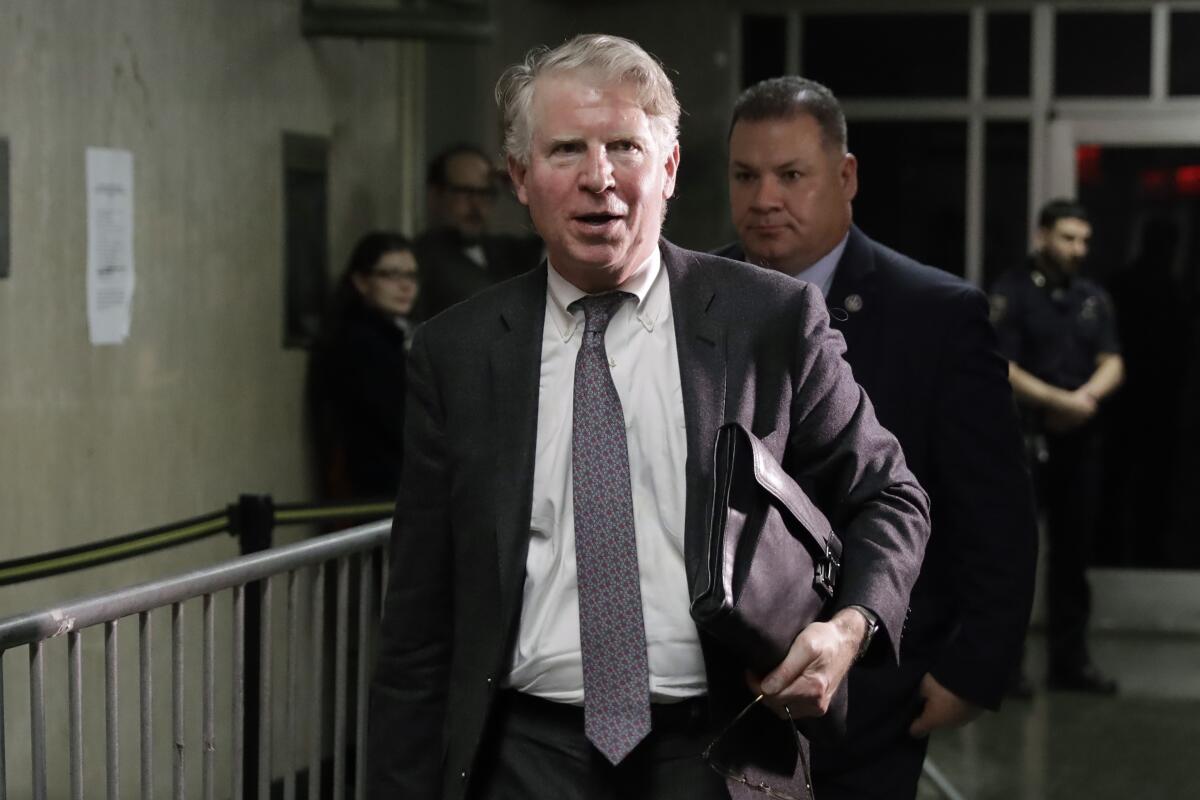Supreme Court rejects Trump’s last bid to shield his finances from New York prosecutors

- Share via
WASHINGTON — The Supreme Court on Monday cleared the way for New York prosecutors to obtain eight years of financial records from the accountants and bankers of former President Trump as part of a criminal fraud and tax investigation involving him and the Trump Organization.
Trump faces possible criminal and civil charges on several fronts, but the New York investigation of his business dealings has moved further than any of the other probes.
Without a comment or dissent, the justices issued a one-line order saying they had denied Trump’s request to block enforcement of subpoenas from the grand jury in New York.
His lawyers had urged the court to block the subpoenas on the grounds they were overly broad and politically motivated.
Manhattan Dist. Atty. Cyrus Vance Jr. has not revealed what the grand jury is investigating, but in court filings his office said it was looking into potential “protracted criminal conduct at the Trump Organization.”
Shortly after the court issued its order, Vance tweeted: “The work continues.”
Trump condemned the decision Monday.
“The Supreme Court never should have let this ‘fishing expedition’ happen, but they did,” he said in a statement. “This is something which has never happened to a president before, it is all Democrat-inspired in a totally Democrat location, New York City and state.”
Michael Cohen, a former lawyer and fixer who worked for the former president, testified that Trump regularly inflated the value of his holdings when he was seeking loans and deflated the value of the same assets to lower his taxes. Making false statements on loan documents or tax filings can be prosecuted as fraud.
During the 2016 presidential campaign, Cohen said, he also arranged hush money payments to two women who had affairs with Trump.
When challenging the subpoenas, Trump had lost before federal judges and U.S. appeals courts in New York and Washington, but he repeatedly won rulings from the Supreme Court to temporarily block the subpoenas from being honored.
Monday’s order on Trump’s taxes did nothing to resolve the mystery of why the justices waited for four months before acting on his final appeal in the case. It’s possible they wanted to wait until his term as president had ended.
In July, the justices rejected Trump’s broad claim that a president is immune from a criminal investigation. Chief Justice John G. Roberts Jr. spoke for the court and reaffirmed the principle that no person, including the president, is above the law and beyond the reach of a grand jury investigation.
But the 7-2 decision in Trump vs. Vance did not end the legal fight.
Trump’s lawyers went back before the same judges in New York to argue that the subpoenas were politically motivated. They lost again in September and again went back to the Supreme Court on Oct. 13 asking for a further delay.
This case involves “the first state subpoena issued to a sitting president,” they said at the time. “Its near limitless reach — in time, scope and geographic reach — has all the hallmarks of a fishing expedition.”
Usually grand juries acting behind closed doors have broad authority to demand records that could show whether a crime may have been committed.
But Trump’s lawyers insisted he was shielded because of his status as president, and they succeeded in winning delays, including after he had lost his bid for reelection.
Separately Monday, the court said it would hear appeals from the American Medical Assn. and abortion rights advocates who object to a Trump administration rule that forbids counselors at federally funded family planning clinics from referring patients for abortion.
Federal law says the funds may not be used in “programs where abortion is a method of family planning,” but for decades courts have been weighing disputes over what counselors may or may not say to their patients. President Biden said his administration plans to issue a new rule to revise the Trump policy, but that may take some time.
In upholding the Trump policy, the 9th Circuit Court noted that it allowed counselors to discuss abortion, so long as they did not not encourage women to pursue that option.
The court will not hear arguments in the case — AMA vs. Cochran — until the fall, and the justices may opt to dismiss it if the Biden administration has put a new rule into effect by then.
More to Read
Get the L.A. Times Politics newsletter
Deeply reported insights into legislation, politics and policy from Sacramento, Washington and beyond. In your inbox three times per week.
You may occasionally receive promotional content from the Los Angeles Times.











